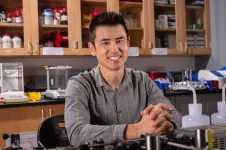(Press-News.org)
New research from a consortium of quantum physicists, led by Trinity College Dublin’s Dr Mark Mitchison, shows that imperfect timekeeping places a fundamental limit to quantum computers and their applications. The team claims that even tiny timing errors add up to place a significant impact on any large-scale algorithm, posing another problem that must eventually be solved if quantum computers are to fulfil the lofty aspirations that society has for them.
It is difficult to imagine modern life without clocks to help organise our daily schedules; with a digital clock in every person’s smartphone or watch, we take precise timekeeping for granted – although that doesn’t stop people from being late!
And for quantum computers, precise timing is even more essential, as they exploit the bizarre behaviour of tiny particles – such as atoms, electrons, and photons – to process information. While this technology is still at an early stage, it promises to dramatically speed up the solution of important problems, like the discovery of new pharmaceuticals or materials. This potential has driven significant investment across the private and public sector, such as the establishment of the Trinity Quantum Alliance academic-industrial partnership launched earlier this year.
Currently, however, quantum computers are still too small to be useful. A major challenge to scaling them up is the extreme fragility of the quantum states that are used to encode information. In the macroscopic world, this is not a problem. For example, you can add numbers perfectly using an abacus, in which wooden beads are pushed back and forth to represent arithmetic operations. The wooden beads have very stable states: each one sits in a specific place and it will stay in place unless intentionally moved. Importantly, whether you move the bead quickly or slowly does not affect the result.
But in quantum physics, it is more complicated.
“Mathematically speaking, changing a quantum state in a quantum computer corresponds to a rotation in an abstract high-dimensional space,” says Jake Xuereb from the Atomic Institute at the Vienna University of Technology, the first author of the paper. “In order to achieve the desired state in the end, the rotation must be applied for a very specific period of time – otherwise you turn the state either too little or too far.”
Given that real clocks are never perfect, the team investigated the impact of imperfect timing on quantum algorithms.
“A quantum algorithm is like an app that runs on a quantum computer,” explains Trinity’s Dr Mitchison. “It was already known that timing errors could disrupt individual quantum logic gates, which are the building blocks of quantum algorithms. Our work extends this to full quantum algorithms, showing exactly how precise the clock must be to achieve a given computational accuracy.”
Since the error gets worse for more complex algorithms, it will ultimately pose a challenge for quantum computers.
“It’s not a problem at the moment,” clarifies Prof. Marcus Huber who leads the research team in Vienna. “Currently, the accuracy of quantum computers is still limited by other factors, for example the precision of the hardware components or the effect of stray electromagnetic fields. But our calculations also show that today we are not far from the regime in which the fundamental limits of time measurement will play the decisive role.”
The team is quick to emphasise that the message is not entirely pessimistic, because the problem could be mitigated in the future by designing clever error correction protocols.
The ASPECTS consortium is funded by the European Union’s Quantum Flagship, while Dr Mitchison is supported by a Royal Society-Science Foundation Ireland University Research Fellowship.
END
Multiple studies have shown that the COVID-19 vaccines do not lead to infertility or pregnancy complications such as miscarriage, but many people are still wary of adverse effects from the vaccine on pregnancy.
A new study led by Boston University School of Public Health (BUSPH) researchers now provides deeper insight into the safety of COVID-19 vaccines for people planning to become pregnant.
Published in the journal Human Reproduction, the study found no increased risk of early or late miscarriage as a result of male ...
INDIANAPOLIS, IND – The Canadian Cardiovascular Society (CCS) released the world’s first classification of acute myocardial infarction (AMI), or heart attack, based on heart tissue damage research that was driven by two cardiovascular investigators within the Ischemic Heart Disease Program of Krannert Cardiovascular Research Center (KCVRC) at Indiana University School of Medicine and Northern Ontario School of Medicine.
The four-stage classification, CCS-AMI, was presented at the Vascular 2023 conference on Oct. 29 in Montréal, Canada, and published ...
ITHACA, N.Y. –Micron-size microplastic debris can be carried by the jet stream across oceans and continents, and their shape plays a crucial role in how far they travel.
A Cornell University collaboration has developed a model to simulate the atmospheric transport of microplastic fibers and shows that flat fibers travel farther in the lower atmosphere, and are more prevalent, than spherical fibers. Previous studies assumed these fibers to be spherical.
The modeling has the potential to help scientists determine the sources of the pervasive waste – which could inform policy efforts to reduce it.
The ...
Colorectal cancer screening is widely recommended for adults ages 45 to 75 with an average risk of developing the disease. However, many people don’t realize that the benefits of screening for this type of cancer aren’t always the same for older adults.
“While many clinicians simply follow guideline recommendations for colon cancer screening in adults within this age range, this isn’t always the best approach,” said Sameer Saini, M.D., M.S., who is a gastroenterologist at both Michigan Medicine and the Lieutenant Colonel Charles S. Kettles VA Medical Center and is as a health ...
NASA’s James Webb Space Telescope has gazed at the Crab Nebula, a supernova remnant located 6,500 light-years away in the constellation Taurus. Since the recording of this energetic event in 1054 CE by 11th-century astronomers, the Crab Nebula has continued to draw attention and additional study as scientists seek to understand the conditions, behavior, and after-effects of supernovae through thorough study of the Crab, a relatively nearby example.
Using Webb’s NIRCam (Near-Infrared Camera) and MIRI (Mid-Infrared Instrument), a team led by Tea Temim at Princeton University is searching for answers about the Crab Nebula’s ...
The impacts of Roe v. Wade's reversal in 2022 are still being understood, but new research from Portland State's Rajiv Sharma provides another piece of the puzzle.
Sharma found that in the wake of the U.S. Supreme Court's decision, female students are more likely to choose a university or college in states where abortion rights and access are upheld. The research, conducted with the Tulane University School of Public Health and Tropical Medicine, indicates a potential impact on future workforces and economic development ...
DALLAS, Monday, October 30, 2023 – The national Board of Directors of the American Heart Association last week voted to provide full support to the House of Cardiology’s consortium proposal to create a new American Board of Cardiovascular Medicine (ABCVM) specifically to certify cardiovascular physicians. The proposal for the new ABCVM was announced on September 21, 2023 by the consortium of professional societies including the American College of Cardiology (ACC), the Heart Failure Society of America (HFSA), the Heart Rhythm ...
RESTON, Va. — The first widescale assessment of methylmercury in adult amphibians in the U.S. to date shows that, in amphibians, this toxic compound is common, widespread and, at least for some, can reach very high levels.
The study, “Broad-scale Assessment of Methylmercury in Adult Amphibians,” which published today in the journal Environmental Science and Technology, brought together scientists from around the country to test more than 3,200 amphibians representing 14 species from 26 populations.
“Amphibians ...
UNIVERSITY PARK, Pa. — Online privacy policies may not only be difficult to find but nonexistent, according to Penn State researchers who crawled millions of websites and found that only one-third of online organizations made their privacy policy available for review.
“Privacy Lost and Found: An Investigation at Scale of Web Privacy Policy Availability,” a paper authored by students and faculty from the Penn State College of Information Sciences and Technology (IST), detailed an analysis of the online privacy policy landscape and studied the unavailability of privacy policies on company domains. It received the Best Student Paper ...
The ability to dynamically track the movement of cells is essential for modeling cellular interactions as they form organs such as the heart. But current microscope technology isn’t up to the task of capturing those movements.
Juhyun Lee, associate professor in the Bioengineering Department at The University of Texas at Arlington, recently received a five-year, $1.94 million grant from the National Institutes of Health to develop a 4D high-resolution imaging system to quantify cell tracking.
Traditional microscopes allow users to zoom in to view an individual cell. However, doing so obscures that cell’s relationship ...

